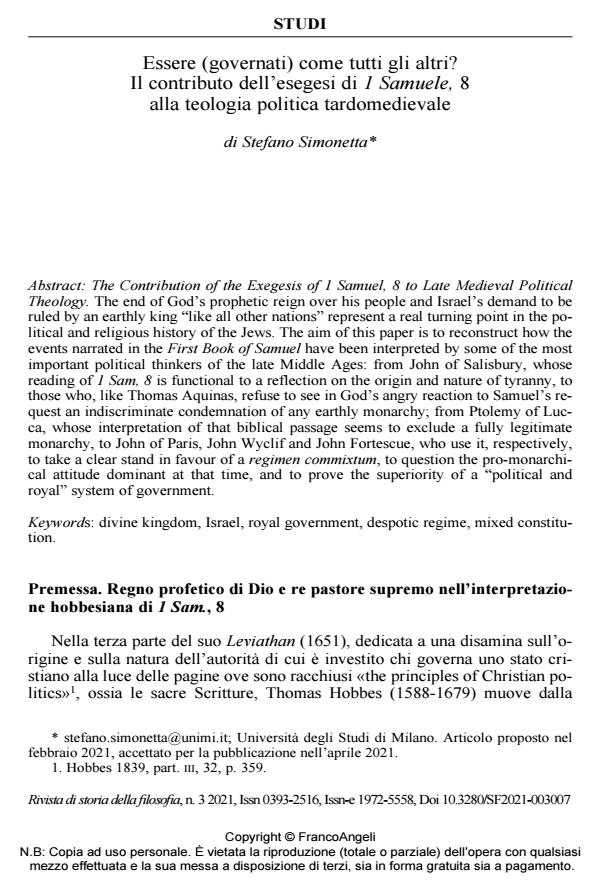Essere (governati) come tutti gli altri? Il contributo dell’esegesi di 1 Samuele, 8 alla teologia politica tardomedievale
Titolo Rivista RIVISTA DI STORIA DELLA FILOSOFIA
Autori/Curatori Stefano Simonetta
Anno di pubblicazione 2021 Fascicolo 2021/3
Lingua Italiano Numero pagine 20 P. 491-510 Dimensione file 375 KB
DOI 10.3280/SF2021-003007
Il DOI è il codice a barre della proprietà intellettuale: per saperne di più
clicca qui
Qui sotto puoi vedere in anteprima la prima pagina di questo articolo.
Se questo articolo ti interessa, lo puoi acquistare (e scaricare in formato pdf) seguendo le facili indicazioni per acquistare il download credit. Acquista Download Credits per scaricare questo Articolo in formato PDF

FrancoAngeli è membro della Publishers International Linking Association, Inc (PILA)associazione indipendente e non profit per facilitare (attraverso i servizi tecnologici implementati da CrossRef.org) l’accesso degli studiosi ai contenuti digitali nelle pubblicazioni professionali e scientifiche
The end of God’s prophetic reign over his people and Israel’s demand to be ruled by an earthly king "like all other nations" represent a real turning point in the political and religious history of the Jews. The aim of this paper is to reconstruct how the events narrated in the First Book of Samuel have been interpreted by some of the most important political thinkers of the late Middle Ages: from John of Salisbury, whose reading of 1 Sam, 8 is functional to a reflection on the origin and nature of tyranny, to those who, like Thomas Aquinas, refuse to see in God’s angry reaction to Samuel’s request an indiscriminate condemnation of any earthly monarchy; from Ptolemy of Lucca, whose interpretation of that biblical passage seems to exclude a fully legitimate monarchy, to John of Paris, John Wyclif and John Fortescue, who use it, respectively, to take a clear stand in favour of a regimen commixtum, to question the pro-monarchical attitude dominant at that time, and to prove the superiority of a "political and royal" system of government.
Parole chiave:divine kingdom, Israel, royal government, despotic regime, mixed constitution.
Stefano Simonetta, Essere (governati) come tutti gli altri? Il contributo dell’esegesi di 1 Samuele, 8 alla teologia politica tardomedievale in "RIVISTA DI STORIA DELLA FILOSOFIA" 3/2021, pp 491-510, DOI: 10.3280/SF2021-003007